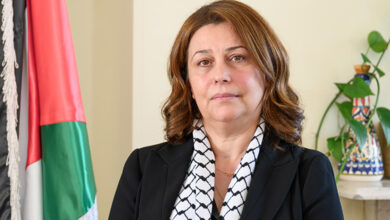Making a difference
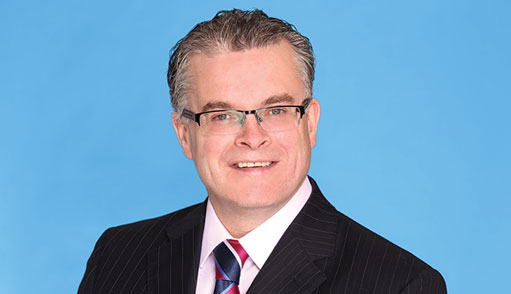
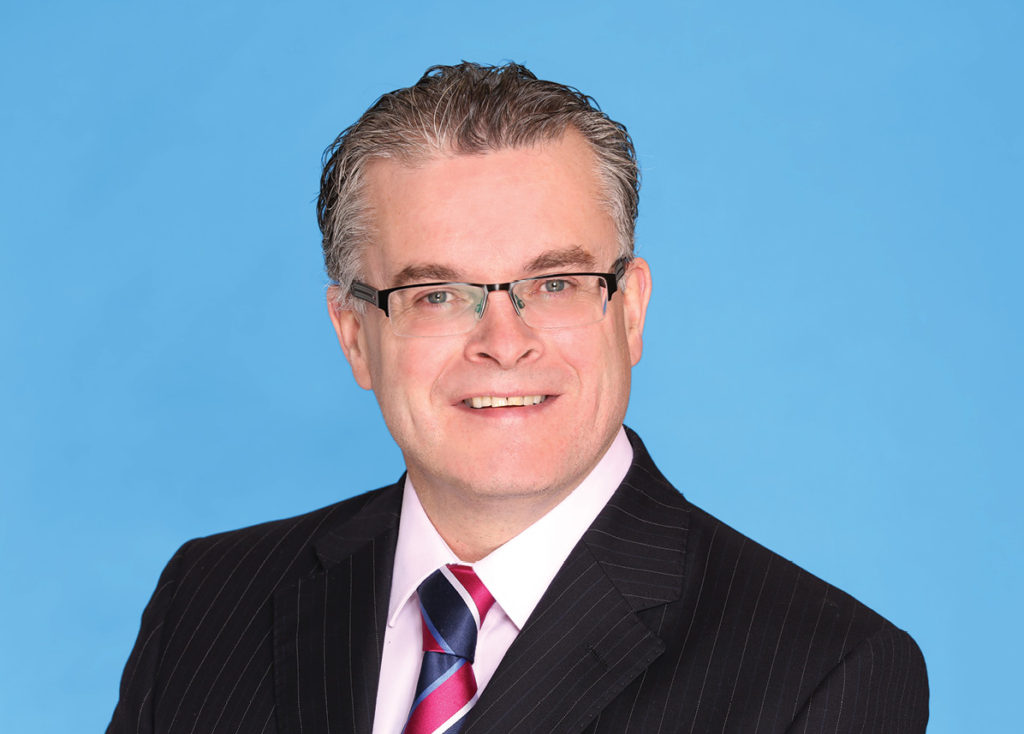
Secretary General for the Department of Communications, Climate Action and Environment, Mark Griffin, speaks with Owen McQuade to outline the breadth of the Department’s responsibilities and key priorities in the coming years.
Mark Griffin started out as a fresh faced 17-year-old in the Central Data Processing Services, a former wing of the Department of Finance. Early on in his career he met a colleague who had been a civil servant for 10 years and admits to being “slightly horrified” at the thought of being somewhere so long. However, despite his initial perception of the civil service as perhaps a stepping stone to something else, he went on to spend 15 years in various roles within the Department of Finance before moving to the Department for the Environment, a role he asserts has been crucial to broadening his experience.
Looking back now on 35 years as a civil servant he reflects on a varied and fulfilling career working on policy issues that impact all our lives. For example, in his last role within the Department of Environment, Community and Local Government he led the Government’s water reform project, as well as the planning division. His career also took him to Brussels where he served in the Department of Foreign Affairs as Environment Counsellor at the Irish Representation to the European Union, leading negotiations on key environmental dossiers during the 2004 Irish Presidency. He took up the post of Secretary General of the then Department of Communications, Energy and Natural Resources three and a half years ago.
Griffin describes the breadth of his current Department’s portfolio, which took on the additional environmental functions on top of its responsibilities for communications, energy and natural resources during the departmental shake-up in July 2016, as “phenomenal” and states that even the new name of the Department doesn’t encapsulate the full range of its responsibilities.
A quick snap shot of some of the challenges facing the Department within their various responsibilities gives Griffin’s points credence. Within communications, the Department has responsibility for the National Broadband Plan, cyber security and the digital economy. In energy, responsibilities cover renewables, energy efficiency, market design and security of supply, and leading the transition to a low carbon economy. The Department also has responsibility for natural resources, which encompasses the whole oil and gas sector, inland fisheries, mining, geological survey and waste management. Postal functions and broadcasting are also under the Department’s governance as well as the wide array of responsibilities in the environment area including climate change, environmental policy, radiological protection and air quality.
“The breadth of the portfolio is quite staggering but it’s also what makes the job so interesting.” This is something that Griffin stresses to new colleagues in the Department, which has begun recruiting new staff after a period of significant entrenchment. “It’s great to see new staff coming into the Department again and the one thing I always emphasise to them is the variety of experience on offer as a civil servant. Our department is not necessarily unique in terms of the diversity of work on offer but there is a huge opportunity for us to make a difference for our fellow citizens”.
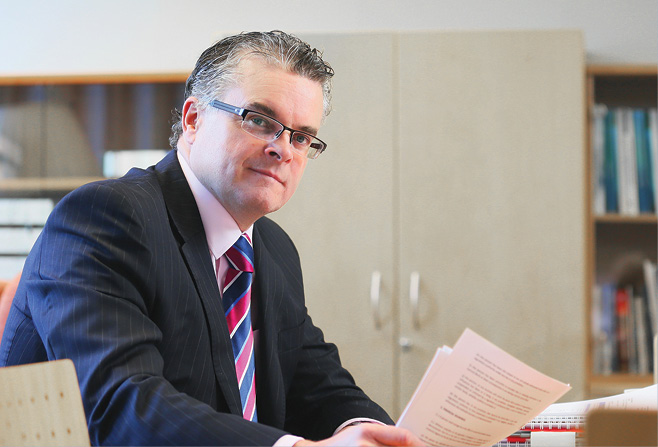
“The breadth of the portfolio is quite staggering but it’s also what makes the job so interesting.”
Griffin highlights the huge commitment of staff in the Department to delivery of a broad range of priorities. “We are a relatively small department with a staff of about 330 but we have responsibility for 17 semi-state bodies and agencies, who employ about 20,000 people, ranging from the very large, such as ESB, to smaller bodies such as ComReg. As a parent department we have a responsibility to ensure effective corporate governance within these bodies and to work with them to make sure that they are making their contribution to the economic and social development of the State. That’s another really interesting facet in the work of the Department.”
Griffin observes that the role of civil servant has changed somewhat since his early days. For many years civil servants operating at senior level had become accustomed to working alongside a significant government majority, and working to a set of well-established rules. “New politics” and working in a minority government arrangement has meant a significant change to how departments are now planning, communicating and delivering policy through the political system. He stresses the positives of change and acknowledges the need for civil servants to adapt to the new political dynamic. “Our Minister [Denis Naughten] is a natural and keen negotiator, with a wealth of experience in seeking the input from other parties within the Oireachtas for many years. The new political dynamic might make decision-making more complex and add a bit more time to the earlier stages of policy development but it ensures that decision-making is more inclusive and informed.”
Energy
Turning to the Department’s priorities for 2017, Griffin points to three key pieces of policy being brought forward this year. The first is the review of the wind energy guidelines, which he explains is a complex balance between ensuring additional renewable energy to comply with 2020 and 2030 targets, and the transition to a low carbon society by 2050, while also ensuring the concerns of local communities are addressed and properly managed. The consideration of community participation, engagement and benefit, reflected in the Programme for Government (PfG), will also be crucial to the second piece of key policy being brought forward in 2017, the new Renewable Electricity Support scheme. Also, key to meeting the Department’s target to deliver 12 per cent of final heat demand from renewable energy by 2020 will be designing and delivering the Renewable Heat Incentive (RHI).
“There has been some controversy around this in the North and we are very conscious of ensuring that the design of our scheme addresses any of the issues that have arisen there. We are comfortable that it will.”
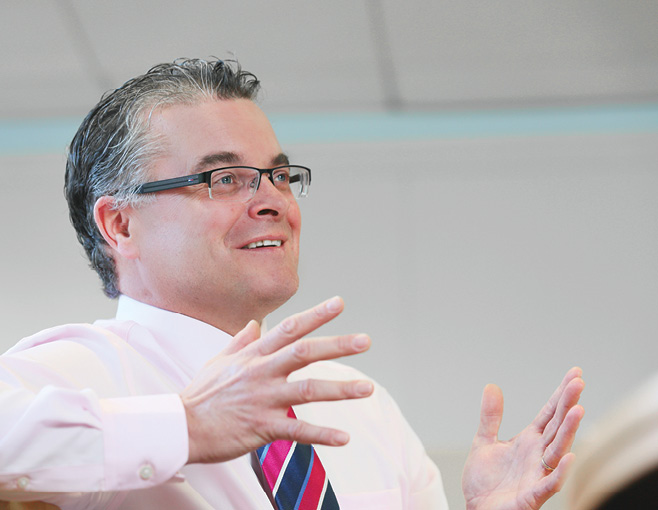
“It’s great to see new staff coming into the Department again and the one thing I always emphasise to them is the variety of experience on offer as a civil servant.”
Griffin believes that in terms of renewable energies, the Department is making good progress on its 2020 target of 16 per cent of gross final energy consumption to come from renewable energy sources set out by the EU. By the end of 2015 the figure was up to 9.1 per cent. Looking specifically at electricity, where the target is 40 per cent by 2020, a breakdown shows that around 25.3 per cent of electricity demand in Ireland was being met from renewables, primarily wind, while 6.5 per cent was from heat and 5.7 per cent from transport. He agrees that the challenge for the Department lies in the heat and transport sectors. The RHI scheme has been identified as the Department’s main method of improving heat energy output; and in transport the Programme for Government outlined the commitment of the establishment of a taskforce on low emission vehicles, chaired by both Griffin’s Department and the Department of Transport, Tourism and Sport, which is expected to submit an interim report in the coming months.
Griffin says that the Department’s focus on energy efficiency has been reflected in a budget allocation of €100 million for energy programmes for 2017, a substantial increase from previous years. However, he is aware that, in order to meet the targets set out for the Department, additional investment will be required and he points to the current review of the Capital Plan as a means to attaining funding for both traditional programmes and new pilot innovations. “One example is the Warmth and Wellbeing scheme, which provides extensive energy efficiency upgrades to those in energy poverty with acute respiratory conditions. We are extending the scheme this year to see if we can intervene in households where there are children suffering from similar respiratory illnesses.”
Griffin does not accept that there is any inconsistency between the Department’s responsibilities in the oil and gas sector and their climate functions stating: “There will remain a significant demand for natural gas, for example, including as a transition fuel. If Ireland manages to benefit from the level of activity off-shore in the Atlantic margin, in terms of another hydrocarbon find, then that will have a substantial positive impact on the economy.”
He describes a “genuine excitement” from the 17 different companies who were granted a total of 28 licensing options in the 2015 licensing round and is quick to praise his colleagues in the petroleum affairs division of the Department, who have worked hard to deepen the knowledge of off-shore Ireland through initiating and supporting data acquisition. Acknowledging the concerns around the impact of surveying, exploring and potentially drilling in an area of large natural habitat, he believes that the Department’s approach to understanding and managing biodiversity impacts has been hugely beneficial. “We are working with the National Parks and Wildlife Service in the ObSERVE programme, a significant piece of work to acquire new baseline data with the aim of filling existing data gaps relating to protected marine species and sites in key offshore basins. That close working relationship ensures that the approach we take with gas exploration is sustainable and is carried out to the highest environmental standards.”
Climate
Last month, the public consultation on the recently published first national draft mitigation plan, the first such plan under the Climate Action and Low Carbon Development Act 2015, closed. While the plan included a number of interesting measures, effectively geared towards making Ireland a low-carbon economy by 2050, Griffin agrees with Minister Naughten’s outlook that exchequer funding alone will not produce significant change. “The Minister is very clear that the issue of climate change needs to be something that society understands and accepts. This was the thinking behind his launch of the National Dialogue on Climate Change.”
The Minister believes that engagement with younger people will be crucial to success for 2050. As well as part-funding the Green-Schools programme being rolled out by An Taisce, the Minister set out his plans to create a steering group for the National Dialogue on Climate Change at the National Youth Council of Ireland. Independently chaired, the steering group will comprise of representatives from citizen and community networks; business and energy sectors; environmental NGOs; as well as government departments and local authorities. As well as that, the Minister has proposed a series of regional gatherings to focus on raising awareness, engagement, and a motivation to act, while orchestrating professionally moderated expert lectures and debates on key policy issues.
Griffin is certain that the success of the plan will be reliant on engagement on both a civic and political level: “We will be actively engaged on the development of the new National Planning Framework because clearly climate and environment policy is intertwined with decisions taken around spatial planning. As well as investing in public awareness campaigns, communications plans and developing an appropriate media presence, the Minister is also very clear that he wants to engage with the political system. So, the Oireachtas committee will have an important role in the cross-party discussion in relation to the changes that have to occur for transition to a low-carbon economy.”
Waste
The 251,000 tonnes of food waste generated by households in Ireland per annum is estimated to cost individual households €700. In response to the stark figures, the Department recently launched the Food Waste Charter and established an action group on wasted food in the supply chain, while providing additional funding to the Stop Food Waste community campaign. Griffin says: “There is a strong focus on improving data availability within the Department and we are working with the Department of Agriculture, Food and Marine and Bord Bia integrating our data with their Origin Green campaign. It’s an area where the Minister is investing a lot of energy and funding to improve”.
“Linked to that is a strong focus on illegal dumping. The Minister launched a new initiative in March, based on the commitment in the PfG, to work closer with local authorities to tackle the problem and develop deterrents. An initial allocation of €650,000 has been made this year for the initiative, which will fund projects specifically for monitoring and surveillance of black spots. We understand from initial contacts that there is a huge level of interest in the initiative.”
Broadband and digital
Speaking in the context of Minister Naughten having just days earlier announced an agreement with eir to provide high-speed broadband to 300,000 rural homes over the next two years, Griffin reasserts just how critical the infrastructure is. “It’s something that city dwellers find hard to understand but the frustration felt by those outside the major cities due to a lack of high-speed broadband is palpable. The Minister is firmly of the view that, given the potential impact of Brexit, both on various economic sectors and on the regions, it is critically important that we equip rural areas with high-speed broadband so that the economic potential of those areas can be fully realised. With the National Broadband Plan state intervention in place, Ireland will be competing with leading countries such as South Korea and Singapore in terms of access to high speed broadband and that will be a very significant competitive advantage for the State.”
Brexit
Griffin concludes by directly referring to Brexit. He says that there is a clear drive from the Department to ensure that benefits secured from the creation of the Single Electricity Market (SEM) are maintained and that work towards the new market I-SEM, which is expected to go live in the middle of next year, is continued. SEM is the Department’s largest concern stemming from Brexit, closely followed by security of supply. The bulk of Ireland’s energy supply comes either from or through the UK. Griffin explains that these were the two key areas raised as priorities when representatives from the Department met with the taskforce set up by the EU’s chief Brexit negotiator, Michel Barnier. However, he acknowledges there are a range of other issues that may fall into the higher priority bracket as exit negotiations unfold, including roaming charges and the challenges facing the audio-visual media sector. “What I can say is that we are working very hard on a departmental and cross-governmental basis to ensure that the impacts of Brexit are fully identified and properly managed.”





